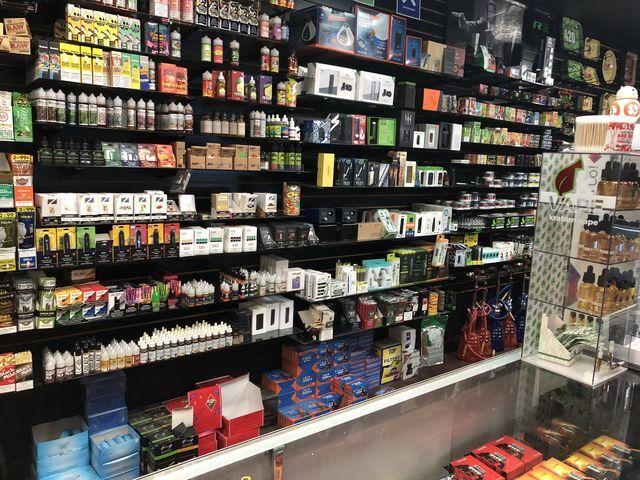The cool mint, bubblegum or strawberry scented clouds outside the classroom are common as vaping continues to be a popular trend.
Vaping has hit college campuses all at once with JUUL e-cigarettes, hookah and THC pens. Students have dived into the vape world at full throttle, some not knowing the consequences of their actions.
The concealable, USB-like e-cigarettes, or JUULs, were introduced in 2015 with a mission to be the alternative for cigarette smokers.
Tanner Hilliard, business management junior, said he started smoking tobacco in cigarettes when he turned 18 years old. He felt the tobacco begin to take a toll on his body, so he switched to JUUL about a year ago. Eventually, he would like to quit vaping as well.
“(JUUL) is more addicting than cigarettes in my opinion,” Hilliard said. “It helps me when I’m studying or stressed.”
JUUL pods come in a variety of flavors and contain nicotine, which is highly addictive. The Truth, an anti-tobacco campaign, states one JUUL pod contains 20 cigarettes worth of nicotine.
Vaping has the capacity to weaken the immune system and damage blood vessels.
Non-smokers have started using JUUL, in part due to how popular it has become. It is most unsafe for those consumers because they are more likely to switch to cigarettes and become addicted.
The long term side effects of vaping have not yet been determined, but it is clear nicotine alters the brain’s chemistry, according to Buzz Feed News.
A “safer” and sociable vaping tool is hookah. San Marcos is home to two hookah lounges: Nebula Hookah Lounge and Hookah House. They are popular destinations to wind down after a night out.
In a study conducted by The Loop, 25 percent of college students reported hookah as their first product smoked. Almost half of non-smoking students reported hookah as an introductory product to smoking cigarettes.
Robbie Cruz, San Marcos resident, does hookah with her friends almost every two months. She said it is not the high that makes her want to do it.
“Hookah is sort of a social thing,” Cruz said. “I enjoy going to do something while I’m drinking with my friends.”
Hookah can have some of the same negatives as smoking cigarettes. The cozy lounge and intricate hookah piece can easily fool students to think otherwise.
According to The Truth, hookah smoke contains tar, carcinogens and carbon monoxide. An hour-long hookah session is the equivalent of smoking 100 cigarettes.
Hookah tobacco can cause different cancers like lung, oral and stomach. Additionally, the hookah mouth pieces are subject to spreading diseases such as herpes if not cleaned properly.
Another part of the vape scene is a completely different substance, and easily disguisable as any other e-cigarette: THC pens, also referred to as dab or wax pens. These devices utilize the battery of an e-cigarette, but have a cartridge filled with marijuana wax, which contains a very high amount of THC depending on the amount of wax.
Vaping cannabis is more discreet than other forms of marijuana practice, but that does not make it most safe. For students finding access to it illegally, they are taking a risk on a substance that has had little regulation.
Just like with JUULs, this kind of vaping can become addicting due to its accessibility.
David Garza, business finance junior, said students who use THC pens are very discreet.
“Dab pens are just as much a problem as students smoking cigarettes on a tobacco-free campus,” Garza said. “As long as (THC pens) are being managed appropriately, most people can’t even tell who is high or who smoked a cigarette. It’s a very sensitive topic because it is still an illegal substance.”
In “The Journal of Toxicological Sciences,” a study proved there were pesticides detected in a third of the concentrate samples of marijuana wax, as stated in East Bay Express. The wax can often be contaminated or tampered with chemicals, thinning out the product and making it dangerous when inhaled at high temperatures.
There are many reasons people choose to smoke cannabis, and vaping is making it easier and highly accessible. Students should be aware of where their product comes from in order to stay safe.
The cannabis industry is growing and more regulation is expected to take place, especially if the nation starts turning green.
College-aged students are old enough to decide what they want to put into their bodies, but the college environment does not mean students should be prone to different cancerous substances.
It is suggested vaping is best fit for individuals who want to gradually quit smoking cigarettes because it is a safer alternative. Students looking to follow the trend should be educated on vaping before taking part.
More information on vaping can be found at the Center for Disease Control.
Categories:
Vaping trend continues to grow on college campuses
January 23, 2019
0
Donate to The University Star
Your donation will support the student journalists of Texas State University. Your contribution will allow us to purchase equipment and cover our annual website hosting costs.
More to Discover








